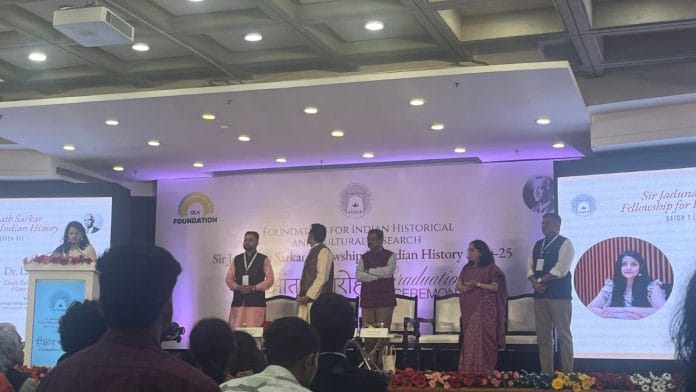New Delhi: They might be fresh off the boat, but the Jadunath Sarkar fellowship’s inaugural batch of scholars have already landed deals with leading publishing houses like Penguin, Westland, and Harper Collins. The fellows, who are part of Vikram Sampath’s Foundation for Indian Historical and Cultural Research, have worked on a disparate range of subjects — from the history of textbook controversies in India to the trajectory of West Bengal; “from renaissance to communist takeover.”
The graduation ceremony, which took place at Delhi’s India International Centre, was a reminder of the overarching goal behind the Sampath-backed think tank— to return the writing of Indian history to Indian scholars —as opposed to “ideologically influenced outsiders and politically motivated narratives.” The event saw high-profile speakers like Union Education Minister Dharmendra Pradhan and economist Dr. Shamika Ravi.
“Serious historical research corrects inherited biases and allows Indians to see themselves, not as passive subjects of history, but as active agents who shape the world,” Ravi said. “Equally important, history builds a sense of national identity. Historical publications help citizens recognise that pluralism is not an accident in India, but its defining characteristic.”
It’s scholarship that binds India together, positions it not only as a modern nation— “but a civilisation force.”
Essentially, the Jadunath Sarkar fellows—named after the nationalist historian who worked extensively on Mughal emperor Aurangzeb—are new-generation custodians, integral to the molding of a new cultural identity.
“It’s very common among the non-left to keep complaining. History has been distorted by the famous Marxist Nehruvian consensus. But what we as civil society are doing about it, is something we seldom pause to think about,” said Sampath. “FIHCR was established as a think tank and institution that would reclaim, research and reimagine India’s civilisational story and history with all the scholarliness and seriousness it deserves.”
Uncovering as a nation-building exercise
The graduation ceremony was followed by a panel discussion with a select group of scholars—those who’ve been able to clinch publishing contracts. Chandrachur Ghose, author of ‘From Renaissance to Communist Takeover: A Brief History of the Contest of Ideas in Bengal and the Creation of a Bengali Identity’, began by pointing out the truism that shaped his research.
“There’s a common phrase used in Bengal: we’re like that only,” he said. “What’s wrong with Bengal? That’s a question that a lot of people seem to be asking today.”
It’s a process that supposedly has century-old research. The state is still reeling from its two Partitions —the first in 1907 and the second in 1947.
“It was a process that started around Independence. The year 1947 gave the state a shock from which it never recovered,” he said. “What I’m trying to look at is a contest of ideas that have generated the kind of influence we have seen.”
Other scholars also shared tales of genesis—from where their research sprung. Nabaarun Barooah was working with the government of Assam in 2021, when the BJP government held a “large pompous celebration” of Assam Diwas.
“[Assam Diwas] It marks the arrival of Ahom prince Chaolung Sukapha from the south of China to the north of Myanmar and his arrival into Assam and the establishment of the Ahom empire,” he explained. “At that point in time, my mind wandered. Was Assam really an entity that only came about in the 13th century?”
He didn’t have to venture too far to find out. He discovered inscriptions in his locality, temples that were built before the 13th century. He started reading, only to realise that sections of the Mahabharata have references to Assam.
It was a rabbit hole turned research topic, which will soon emerge in the form of a published manuscript.
Such is the space being cultivated by FIHCR, which is already readying for its next batch of scholars—among them is Jindal University professor Hindol Sengupta.
“All these activities aren’t merely academic exercises, but nation-building exercises,” said Sampath. “We could not have thought of a more fitting inspiration than Jadunath Sarkar.”
(Edited by Ratan Priya)







Sorry to say that my grand father, Sir Jadunath Sarkar, the renowned historian would not have liked that his name would be used for distorting history. This shows the pettiness of these people that they are trying to validate / authenticate their work by using his name.